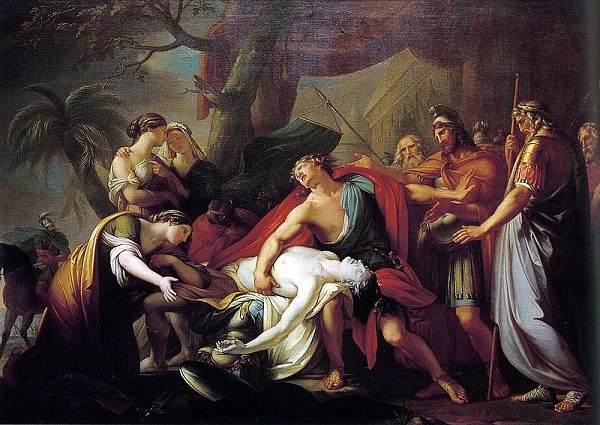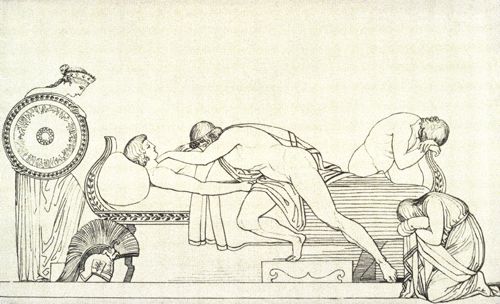Achilles and Patroclus — more than friends?
Posted on: 25 October 2019 by Charlotte Wylie, Eleanor Fussell and Christian Shrier in 2019 posts

Charlotte Wylie (BA Classical Studies with Egyptology), Eleanor Fussell (BA Classical Studies) and Christian Shrier (BA Ancient History) ask whether there is more to the relationship between Achilles and Patroclus than meets the eye.
Achilles and Patroclus were just two very close but completely platonic companions, correct? Wrong – at least we think so and we’re award winning presenters (a second-year module presentation counts, we checked).
You should forget Aphrodite’s ambrosial good looks or Helen’s unparalleled beauty that caused a decade long war. We wish to lead you on a journey on whether Achilles and Patroclus were Homer’s heyday homosexuals or not. But, more importantly, we want to convince you why it still matters now.
Throughout Classical history, scholars would consistently deny and bury any evidence of homosexuality in the Iliad. This was rife in the Victorian period as at that time homosexuality was illegal in Britain. Even in the 2004 film Troy, they were portrayed as cousins. This was explained away by the director, Wolfgang Peterson, who attempted to remove any controversy by claiming that he was not directly following the Iliad, but the whole epic cycle. It is only recently, particularly in the last decade, that LBGTQ+ stories have begun to be discussed in a more public sphere and more widely accepted.

Achilles mourns Patroclus - John Flaxman
Evidence for homosexuality throughout the Iliad is ambiguous (perhaps intentionally) in terms of describing Patroclus and Achilles’ ‘friendship’. Translations also vary, meaning we are left with many different meanings, which leaves it to the audience to decide for ourselves. Even in classical Greece people could not agree on the relationship of Patrochilles. In Plato’s Symposium Phaedrus argues against Aeschylus’ interpretation of their relationship (Aeschylus, fr. 64), that Achilles was not the erastes (older instigator of love), and Patroclus was not the young object of this love (eromenos). Regardless of the question of pederasty, they assume without question that they indeed were lovers.
Achilles himself laments that Patroclus’ death is more painful to him than the death of his own father or child would be (Il. 19.321-327). Homer reiterates frequently how affected Achilles was by Patroclus’ death; his reaction to the news was extremely emotional with him pulling out his hair and beating his chest. This display of raw emotion implies that there must have been a deep connection between these two men. Homer writes “Achilles wept, ever remembering his dear comrade, nor did sleep, that subdues all, lay hold of him, but he turned ever this way and that, yearning for the manhood and valiant might (menos) of Patroclus” (Il. 24.3-6). Scholars have interpreted this in different ways. For example, Davidson (The Greeks and Greek Love: A Radical Reappraisal of Homosexuality in Ancient Greece, London, 2008, p. 258) says that Achilles longs for Patroclus’s ‘‘manliness and spunk” and although menos could mean ‘‘spunk” in the broad sense of courage, a fragment by Archilochus shows it could also mean ‘‘spunk’’ in the more specific sense of ‘‘semen’’.
W. M. Clarke (‘Achilles and Patroclus in Love’, Hermes 106 (1978): 381-396, p. 393) said: ‘The essential question, however, is not whether the heroes engage in sodomy, but whether they are in love’. We prefer to not use the old Church shame term of ‘sodomy’, but we agree that it is obvious that the pair had an intense, sexual relationship. We also believe that Achilles would not beat his chest in grief, a typical Greek action of mourning - normally reserved for professional mourners - unless he was in love. And we can’t even get a text back… Their relationship was significant then, and even more so now, because it reiterates that LOVE IS LOVE, and everyone, whether warriors under great pressure to be masculine, or modern-day students, deserve to have the love they want, with proper representation in culture, without backlash.
Discover More
Study in the Department of Archaeology, Classics and Egyptology at the University of Liverpool.
Keywords: Achilles, Archaeology, Classics, Egyptology, Student, Equality, Diversity and Inclusion, Liverpool, LGBT, Patroclus, Iliad.